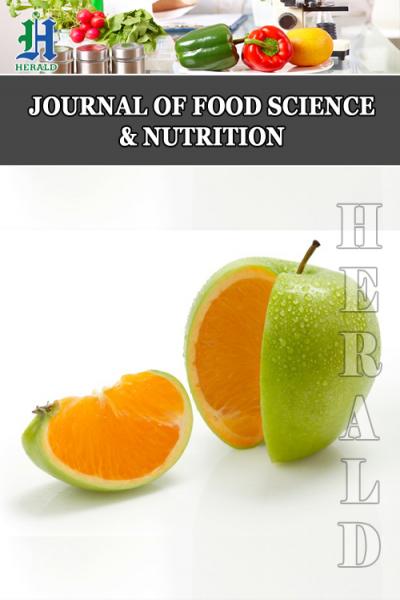
Anti-Aging Effects of Hydrolyzed Collagen Beverage with Herbal Extracts on Facial Skin: A Double-Blind, Randomized, Placebo-Controlled Trial
*Corresponding Author(s):
Chi-Fu ChiangResearch And Design Center, TCI CO., Ltd., Taipei, Taiwan
Tel:+886 287977811,
Email:Jimmy.Chiang@tci-bio.com
Abstract
The anti-skin aging studies of hydrolyzed collagen combined with herbal extracts were currently based on cell or animal models, and few clinical studies have been reported. This clinical study investigated the combination of hydrolyzed collagen with goji berry, aloe vera, chamomile, and acerola cherry to improve skin parameters. Using combination of hydrolyzed fish collagen and herbal extracts to develop a new functional formula for skin improvement. Sixty subjects were randomly allocated (in a 1:1 ratio) to the placebo or a collagen beverage. Compared to placebo, the supplement significantly increased skin collagen content (6.1% vs. 3.3%, p<0.001), elasticity (8.2% vs. 0.0%, p<0.001), moisture (5.2% vs. 0.8%, p<0.05), whitening (4.1% vs. 0.3%, p<0.001), while reducing melanin content (-2.8% vs. 1.4%, p<0.05). There was a non-significant reduction in the appearance of wrinkles (-19.1% vs. -3.8%), visible spots (-6.3% vs. 3.8%), and UV spots (-4.4% vs. 1.0%). The improvement levels indicated competitive skin improvement effects in comparison with previous studies. This clinical study demonstrates the combination of hydrolyzed collagen and goji berry, aloe vera, chamomile, and acerola cherry for substantial improvements in facial skin's structural and functional appearance.
Keywords
Herbal extracts; Hydrolyzed fish collagen; Skin aging
Introduction
Anti-aging skin care is an increasingly popular topic in the cosmetic and aesthetic fields. Skin aging includes thinning of the skin, loss of elasticity and moisture, the formation of pigmentation, and the development of wrinkles [1]. Associated with skin aging is a reduction of epithelial turnover rate and cellular recovery and a reduction of elastin and collagen content, collectively resulting in increased formation of wrinkles or folds in the skin [2]. The current skin anti-aging strategies include topical use of skin care products containing anti-aging ingredients, dermabrasion, laser, botulinum injections, filler injections, and facelifts [1]. Oral use of anti-aging skin care products was the most convenient and cheapest way to achieve skin anti-aging effects [3]. However, it was accompanied by high cost-effectiveness, a painful treatment process, and the necessity of repeated treatment. Thus, as functional foods and oral supplements, nutraceuticals are increasingly investigated to improve skin health.
Hydrolyzed collagen from different sources had been proposed for skin care, such as cow, pig, chicken, and fish collagen. Marine fish collagen and collagen peptides had a high degree of homology to human structure and bioavailability through the gastrointestinal barrier [3]. Some studies have shown that hydrolyzed fish collagen supplements can improve skin wrinkles, elasticity, and moisture and have been proven to reduce wrinkles and pores. In addition to fish collagen, natural plant extracts were recently added to skin care products [4]. Since the active ingredients come from natural herbs and do not contain heavy metals, hormones, and antibiotics, and has become a new trend for people to pursue natural beauty.
Goji berry had been used for centuries in traditional Chinese medicine for a wide range of medicinal and beauty purposes. Goji berry had excellent antioxidant and immunomodulatory potential [5]. The ingredients of Goji berry include flavonoids which may help reduce inflammation, thereby minimizing signs of aging [6]. Additionally, goji berry contains vitamins, minerals, and other nutrients, which may reduce wrinkles and promote collagen production [6]. Aloe vera was a cactus-like plant grown in desert areas worldwide. Its leaves produced a gel rich in vitamins A, C, E, and B12 [7]. Studies have shown that aloe vera can promote the production and release of collagen, accelerate wound healing time, and limit scar formation [8]. Aloe vera has an antioxidant effect, which can help repair sunburn and slow down skin aging [9]. In addition, aloe vera contained 98% water, which helped moisturize, soothe and moisturize the skin [10]. Chamomile has long been a chosen ingredient in soothing skin care regimens, contains the antioxidant apigenin, which aids in lowering inflammation by inhibiting the release of inflammation-causing chemicals [11]. In addition to its astringent and brightening properties, skin care creams containing chamomile also tighten pores and soften the skin, reducing acne scars and pigmentation [12]. Acerola cherries had a very high vitamin C content and increased collagen production [13]. Acerola cherries contain functional ingredients as carotenoids, γ-Aminobutyric Acid (GABA), and polyphenols [14]. Oral intake of acerola cherries can effectively reduce UVB-induced hyperpigmentation [15]. Although several preclinical studies provided evidence for the beneficial effect of hydrolyzed collagen and herbal extracts on skin health, less information was known about the clinical benefits.
This study used a hydrolyzed collagen-containing beverage, which contained goji berry, aloe vera, chamomile, and acerola cherry, to explore whether the skin can be improved after consuming the collagen beverage. This study evaluated the clinical benefits of a 4-week supplementation of a collagen beverage on skin appearance.
Materials and Methods
Clinical trial design
The study was registered in clinicaltrials.gov (No. NCT04878536), was performed under a protocol approved by the Antai Medical Care Cooperation Antai- Tian-Sheng Memorial Hospital Institutional Review Board (Approval Number: 21-042-B), and was conducted according to the code of ethics on human experimentation established by the Declaration of Helsinki (1964) and its amendments. Written informed consent was obtained from all participants after a full explanation of the study. A double-blinded, placebo-controlled, randomized study was conducted. The subjects were randomly assigned to two groups, with 30 subjects in each group. The subjects were informed to consume one bottle of the supplement daily for four weeks. Before measurements, subjects were instructed to wash and wipe their face and acclimate for at least 30 minutes. The skin conditions of the subjects were measured on week 0 and week 4 of the trial. Inclusion criteria: Healthy adults aged above 20 years old. The exclusion criteria included: i) skin disease, liver cirrhosis, or chronic renal failure; ii) allergy to cosmetics, drugs, or foods; iii) pregnant and breastfeeding; iv) taking chronic drugs; v) people who had any cosmetic procedures (intense pulse light, medical peelings, or laser therapy) before four weeks of the study.
Supplement formulation
The Collagen Beverage marine collagen beverage (Isagenix Worldwide LLC) contains 10% hydrolyzed fish collagen, 0.4% ascorbic acid, 0.1% goji berry, 0.1% aloe vera, 0.1% acerola cherry, 0.02% chamomile, citric acid, and water. The placebo beverage contains primarily citric acid and water. Subjects were required to consume 50 mL of the collagen beverage or a placebo beverage daily for 4 weeks.
Clinical skin efficacy assessment
DermaLab® Series SkinLab Combo was utilized to scan and analyze skin collagen density. The color scale indicates collagen density; white reflects the highest collagen density, and black reflect the lowest. Cutometer® dual MPA580 was utilized to measure skin elasticity, and the higher the relative value, the more significant the improvement. VISIA™ Complexion Analysis was utilized to measure skin wrinkles. Wrinkles are identified by their characteristic long, narrow shape. The green lines reflect the wrinkles that the computer used to analyze wrinkle presence and depth. Corneometer® CM825 was utilized to measure skin moisture content, and the higher the relative value, the more significant the improvement. Chroma Meter MM500 was utilized to measure skin tone, and the higher the relative value, the whiter the skin tone. Mexameter® MX18 was utilized to measure skin melanin index, and the lower the relative value, the more significant the improvement. VISIA Complexion Analysis System was utilized to measure visible skin spots and UV spots, and the lower the relative value, the more significant the improvement.
Statistical analysis
The comparison of measurement results for skin parameters among groups and between groups was analyzed by one-way repeated measures ANOVA and one-way ANOVA, respectively, followed by Tukey's post hoc test through GraphPad Prism, as p < .05 was considered statistical significance.
Results
Combined with goji berry, aloe vera, chamomile, and acerola cherry increased skin collagen, elasticity, moisture, and decreased wrinkles
First, we want to know whether collagen beverages improve skin collagen, elasticity, wrinkles, and moisture. Subjects were required to consume 50 mL of the collagen beverage or a placebo beverage daily for 4 weeks. The images of collagen and wrinkle are shown in figure 1. The skin collagen density was significantly increased 6.1% after consuming the collagen beverage for four weeks compared to baseline (week 0), and also significantly increased 2.8 % compared to the placebo group (Figure 1A). The skin elasticity significantly increased 8.2% after consuming the collagen beverage for four weeks compared to baseline (week 0) and significantly increased 8.2 % compared to the placebo group (Figure 1B). After consuming the collagen beverage for four weeks, the skin wrinkles decreased 19.1% compared to baseline (week 0) and decreased 14 % compared to the placebo group (Figure 1C). In addition, skin moisture content was significantly increased 5.2% compared to baseline (week 0) and significantly increased 4.4% compared to the placebo group (Figure 1D). These results indicated that the collagen beverage increased skin collagen, elasticity, moisture, and decreased wrinkles (Figure 2).
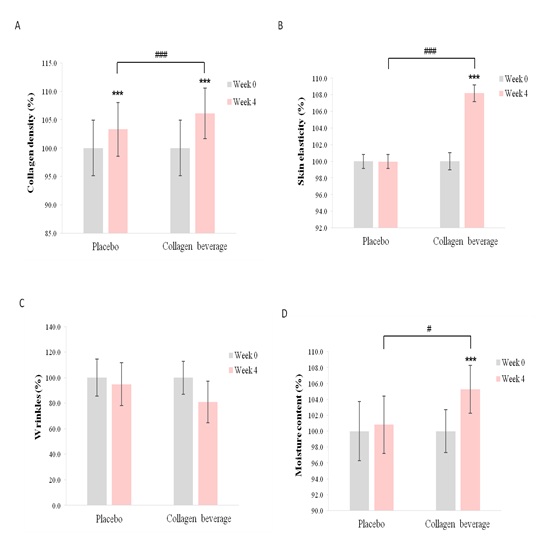 Figure 1: The collagen beverage improved skin collagen, elasticity, wrinkles, moisture. The (A) collagen, (B) elasticity, (C) wrinkles, (D) moisture, (n=30; mean value±S.E.M.) (*, compared with before using (week 0). #, compared with placebo) (*, p<0.05, **, p<0.01, ***, p<0.001) ( # , p<0.05, ###, p<0.001).
Figure 1: The collagen beverage improved skin collagen, elasticity, wrinkles, moisture. The (A) collagen, (B) elasticity, (C) wrinkles, (D) moisture, (n=30; mean value±S.E.M.) (*, compared with before using (week 0). #, compared with placebo) (*, p<0.05, **, p<0.01, ***, p<0.001) ( # , p<0.05, ###, p<0.001).
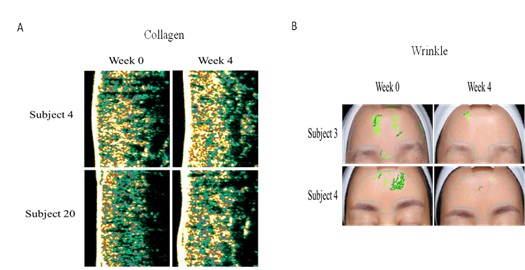 Figure 2: Improvement of skin collagen and wrinkles for the collagen beverage. The image of (A) skin collagen, (B) wrinkles.
Figure 2: Improvement of skin collagen and wrinkles for the collagen beverage. The image of (A) skin collagen, (B) wrinkles.
Combined with goji berry, aloe vera, chamomile, and acerola cherry decreased skin melanin, visible and UV spots, and increased whitening.
Second, we want to explore whether the collagen beverage improved skin whitening, melanin, visible spot, and UV spot. After consuming the collagen beverage for four weeks, the L* value significantly increased 4.1% compared to baseline (week 0) and significantly increased 3.8% compared to the placebo group (Figure 3A). The skin melanin index significantly decreased 2.8% after consuming the collagen beverage for four weeks compared to baseline (week 0) and significantly decreased 4.2% in the placebo group (Figure 3B). The visible skin spots significantly decreased 6.3% after consuming the collagen beverage for four weeks compared to baseline (week 0) and decreased 2.5% in the placebo group (Figure 3C). The UV spots significantly decreased 4.4% after consuming the collagen beverage for four weeks compared to baseline (week 0) and decreased 3.4% compared to the placebo group (Figure 3D). The images of visible spots and UV spots are shown in figure 4. These results indicated that the collagen beverage decreased skin melanin, visible and UV spots, and increased whitening. The above results are summarized in table 1.
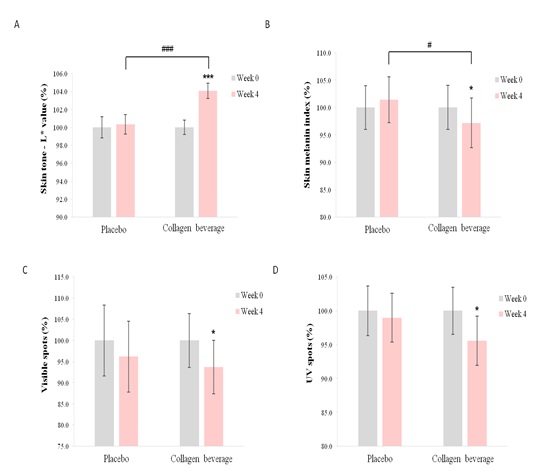 Figure 3: The collagen beverage improved skin whitening, melanin, spots, and UV spots. The (A) L value, (B) melanin, (C) spots, (D) UV spots, (n=30; mean value±S.E.M.) (*, compared with before using (week 0). #, compared with placebo) (*, p<0.05, **, p<0.01, ***, p<0.001) ( # , p<0.05, ###, p<0.001)
Figure 3: The collagen beverage improved skin whitening, melanin, spots, and UV spots. The (A) L value, (B) melanin, (C) spots, (D) UV spots, (n=30; mean value±S.E.M.) (*, compared with before using (week 0). #, compared with placebo) (*, p<0.05, **, p<0.01, ***, p<0.001) ( # , p<0.05, ###, p<0.001)
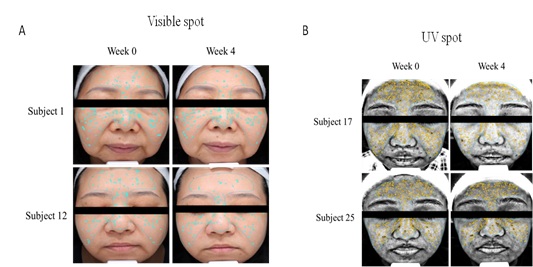 Figure 4: Improvement of skin collagen and wrinkles for the collagen beverage. The image of (A) visible spots, (B) UV spots.
Figure 4: Improvement of skin collagen and wrinkles for the collagen beverage. The image of (A) visible spots, (B) UV spots.
|
Skin Parameter |
Placebo Beverage (% change) |
Collagen Beverage (% change) |
|
Collagen density |
3.3%*** |
6.1%***, ### |
|
Skin elasticity |
0.00% |
8.2%***, ### |
|
Wrinkles |
-5.10% |
-19.10% |
|
Moisture content |
0.80% |
5.2%***, # |
|
L* value |
0.30% |
4.1%***, ### |
|
Melanin index |
1.40% |
-2.8%*, # |
|
Visible spots |
-3.80% |
-6.3%* |
|
UV spots |
-1.00% |
-4.4%* |
Table 1: Summary of the skin parameter changes after collagen and placebo supplementation.
Note : Significant difference versus baseline: *, p<0.05; **, p<0.01; ***, p<0.001;
Significant difference versus placebo: #, p<0.05; ##, p<0.01; ###, p<0.001
Discussion
This study found that a collagen beverage containing goji berry, aloe vera, chamomile, and acerola cherry promoted collagen production, improved elasticity, anti-wrinkle, and increased moisture, whitened, and removed spots, suggesting the potential of collagen beverage for improving skin conditions. These findings support other studies documenting the skin health benefits of collagen and hydrolyzed collagen supplementation (18-20).
Goji berry was rich in many biologically active compounds with high antioxidant potential, such as vitamin A carotenoids, compounds associated with skin health [6]. Carotenoids also exhibit antioxidant properties, protecting the skin barrier and fighting free radicals, while vitamin A can promote cell renewal and keep the skin bright and white [16]. Goji berry was rich in vitamin B2, which maintained immune and digestive functions, increased skin moisture, and decreased spots and wrinkles [6]. Goji berry also contains a lot of vitamin C, promoting collagen production and keeping the skin elastic [2,17]. Goji berry had been proven to inhibit photoaging caused by UVB exposure [18]. Goji berry can inhibit the formation of UVB-induced wrinkles and collagen damage by inhibiting Extracellular Signal-Regulated Kinase (ERK), Mitogen-Activated Protein Kinase (MAPK), and Matrix Metalloproteinase 9 (MMP-9) [19].
Most cosmetic and medicinal products were produced from aloe vera, and a variety of active ingredients had been identified in aloe vera extract, including vitamins, minerals, lignin, saponins, anthraquinones, phenolic compounds, sterols, and salicylic acid [20]. Aloe polysaccharides can regulate immune function, activate immune cells in the basal layer of skin, enhance local immune function and repair function, remove skin melanin, reduce free radical damage, and increase skin elasticity [21]. The subjects took aloe vera gel powder for eight weeks and found that it can increase skin moisture content and reduce wrinkles and pores [22]. The sterols in aloe vera powder can reduce facial wrinkles and treat dry skin [22]. Aloe vera gel can significantly improve the wrinkles and elasticity of photoaging human skin, increase collagen production, and decrease the collagen-degrading MMP-1 gene expression [23].
Chamomile has flavonoids, among which apigenin and apigenin-7-glycoside were the most abundant [24]. Moreover, chamomile extract can effectively reduce free radicals, reduce skin moisture loss and spots, and maintain skin barrier function [25]. The flavonoids in chamomile can penetrate below the skin surface into deeper skin layers [11]. The formulas containing chamomile do not cause skin irritation and can improve skin hydration through Kelch-like erythroid cell-derived protein with cap-n-collar homology-associated protein 1 (KEAP1)/NF-E2-Related Factor 2 (NRF2) signaling [26]. Acerola cherry extract can inhibit tyrosinase activity in melanocytes to inhibit melanin production, and acerola cherry extract can prevent UVB-induced skin pigmentation in brown guinea pigs [14]. In addition, acerola cherry extract has a high antioxidant capacity, can delay skin aging, and make skin smooth because it is rich in vitamin C and can further promote collagen synthesis [13].
Aloe vera dietary supplements with goji berry extract can reduce and strengthen the immune system and repair the body's metabolism [27]. In addition, the combined use of chamomile and acerola cherries can reduce the damage of free radicals to the skin [28]. Consistent with our results, combined with goji berry, aloe vera, chamomile, and acerola cherry, can improve skin conditions.
Conclusion
In short, through clinical studies, we had confirmed that hydrolyzed collagen beverages containing goji berry, aloe vera, chamomile, and acerola cherry could significantly improve skin conditions, which may be due to the combination of different effective substances in various plant extracts.
Conflicts of Interest
All authors declare no conflict of interest.
References
- Ganceviciene R, Liakou AI, Theodoridis A, Makrantonaki E, Zouboulis CC (2012) Skin anti-aging strategies. Dermatoendocrinol 4: 308-319.
- Pullar JM, Carr AC, Vissers MCM (2017) The roles of vitamin C in skin health. Nutrients 9: 866.
- Leon-Lopez A, Morales-Penaloza A, Martinez-Juarez VM, Vargas-Torres A, Zeugolis DI, et al. (2019) Hydrolyzed collagen-sources and applications. Molecules 24: 4031.
- Venkatesan J, Anil S, Kim SK, Shim MS (2017) Marine fish proteins and peptides for cosmeceuticals: A review. Mar Drugs 15: 143.
- Shahrajabian MH, Sun W, Cheng Q (2018) A review of goji berry (Lycium barbarum) in traditional chinese medicine as a promising organic superfood and superfruit in modern industry. Academia Journal of Medicinal Plants 6: 437-445.
- Ma ZF, Zhang H, Teh SS, Wang CW, Zhang Y, et al. (2019) Goji berries as a potential natural antioxidant medicine: An insight into their molecular mechanisms of action. Oxid Med Cell Longev 2019: 2437397.
- Surjushe A, Vasani R, Saple DG (2008) Aloe vera: A short review. Indian J Dermatol 53: 163-166.
- Hekmatpou D, Mehrabi F, Rahzani K, Aminiyan A (2019) The effect of aloe vera clinical trials on prevention and healing of skin wound: A systematic review. Iran J Med Sci. 44(1):1-9.
- Sanchez M, Gonzalez-Burgos E, Iglesias I, Gomez-Serranillos MP (2020) Pharmacological update properties of aloe vera and its major active constituents. Molecules 25: 1324.
- Xie Y, Zhu G, Yi J, Ji Y, Xia Y, et al. (2021) A new product of multi-plant extracts improved skin photoaging: An oral intake in vivo study. J Cosmet Dermatol.
- Srivastava JK, Shankar E, Gupta S (2010) Chamomile: A herbal medicine of the past with bright future. Mol Med Rep 3: 895-901.
- Niknam S, Tofighi Z, Faramarzi MA, Abdollahifar MA, Sajadi E, et al. (2021) Polyherbal combination for wound healing: Matricaria chamomilla L. and Punica granatum L. Daru 29: 133-145.
- Prakash A, Baskaran R (2018) Acerola, an untapped functional superfruit: A review on latest frontiers. J Food Sci Technol 55: 3373-3384.
- Hanamura T, Uchida E, Aoki H (2009) Skin-lightening effect of a polyphenol extract from acerola (Malpighia emarginata DC.) fruit on UV-induced pigmentation. Biosci Biotechnol Biochem 72: 3211-3218.
- Sato Y, Uchida E, Aoki H, Hanamura T, Nagamine K, et al. (2017) Acerola (Malpighia emarginata DC.) juice intake suppresses UVB-induced skin pigmentation in SMP30/GNL knockout hairless mice. PLoS One 12: 0170438.
- Schagen SK, Zampeli VA, Makrantonaki E, Zouboulis CC (2012) Discovering the link between nutrition and skin aging. Dermatoendocrinol 4: 298-307.
- Gref R, Deloménie C, Maksimenko A, Gouadon E, Percoco G, et al. (2020) Vitamin C-squalene bioconjugate promotes epidermal thickening and collagen production in human skin. Scientific Reports 10: 16883.
- Reeve V, Allanson M, Arun S, Titmuss D, Painter N (2010) Mice drinking goji berry juice (Lycium barbarum) are protected from UV radiatio-induced skin damage via antioxidant pathways. Photochem Photobiol Sci 9: 601-607.
- Im AR, Lee HJ, Youn UJ, Hyun JW, Chae S (2016) Orally administered betaine reduces photodamage caused by UVB irradiation through the regulation of matrix metalloproteinase-9 activity in hairless mice. Mol Med Rep 13: 823-828.
- Sadgrove NJ, Simmonds MSJ (2021) Pharmacodynamics of Aloe vera and acemannan in therapeutic applications for skin, digestion, and immunomodulation. Phytother Res 35: 6572-6584.
- Yuan L, Duan X, Zhang R, Zhang Y, Qu M (2020) Aloe polysaccharide protects skin cells from UVB irradiation through Keap1/Nrf2/ARE signal pathway. J Dermatolog Treat 31: 300-308.
- Tanaka M, Misawa E, Yamauchi K, Abe F, Ishizaki C (2015) Effects of plant sterols derived from Aloe vera gel on human dermal fibroblasts in vitro and on skin condition in Japanese women. Clin Cosmet Investig Dermatol 8: 95-104.
- Cho S, Lee S, Lee MJ., Lee DH, Won CH, et al. (2009) Dietary aloe vera supplementation improves facial wrinkles and elasticity and it increases the type I procollagen gene expression in human skin in vivo. Ann Dermatol 21: 6-11.
- Srivastava JK, Gupta S (2009) Extraction, characterization, stability and biological activity of flavonoids isolated from chamomile flowers. Mol Cell Pharmacol 1: 138.
- Garbuio DC, Zamarioli CM, Melo MO, Campos P, Carvalho EC, et al. (2018) Safety of a formulation containing chitosan microparticles with chamomile: Blind controlled clinical trial. Rev Lat Am Enfermagem 26: 3075.
- Ogawa T, Ishitsuka Y, Nakamura Y, Okiyama N, Watanabe R, et al. (2020) Honey and chamomile activate keratinocyte antioxidative responses via the KEAP1/NRF2 system. Clin Cosmetic investig Dermatol 13: 657-660.
- Ren Z, Na L, Xu Y, Rozati M, Wang J, et al. (2012) Dietary supplementation with lacto-wolfberry enhances the immune response and reduces pathogenesis to influenza infection in mice. J Nutr 142: 1596-1602.
- Hoang HT, Moon JY, Lee YC (2021) Natural antioxidants from plant extracts in skincare cosmetics: Recent applications, challenges and perspectives. Cosmetics 8: 106.
Citation: Lin YK, Liang CH, Lin YH, Chan ST, Gumpricht E, et al. (2022) Anti-Aging Effects of Hydrolyzed Collagen Beverage with Herbal Extracts on Facial Skin: A Double-Blind, Randomized, Placebo-Controlled Trial. J Food Sci Nutr 8: 128.
Copyright: © 2022 Yung-Kai Lin, et al. This is an open-access article distributed under the terms of the Creative Commons Attribution License, which permits unrestricted use, distribution, and reproduction in any medium, provided the original author and source are credited.
